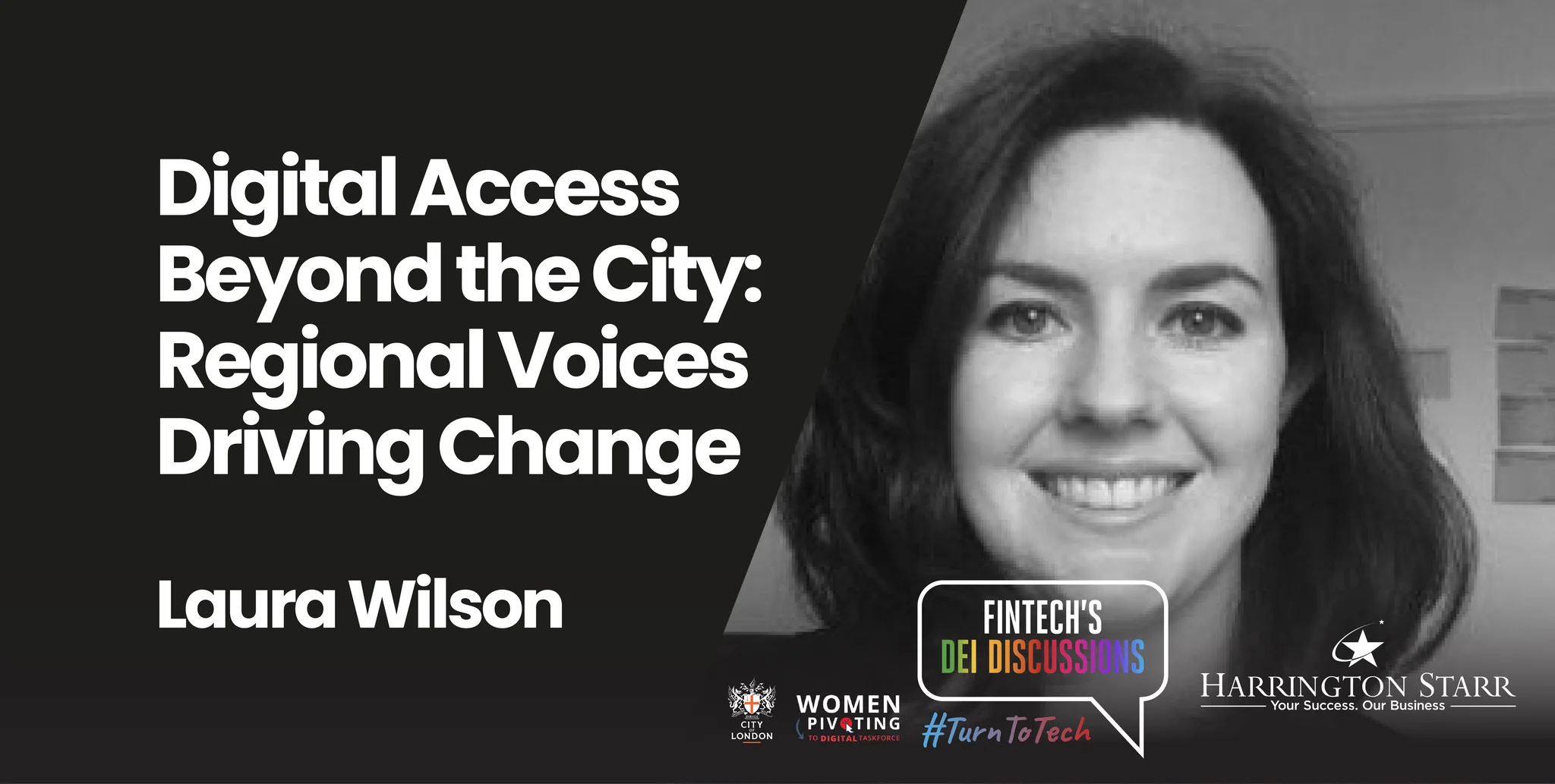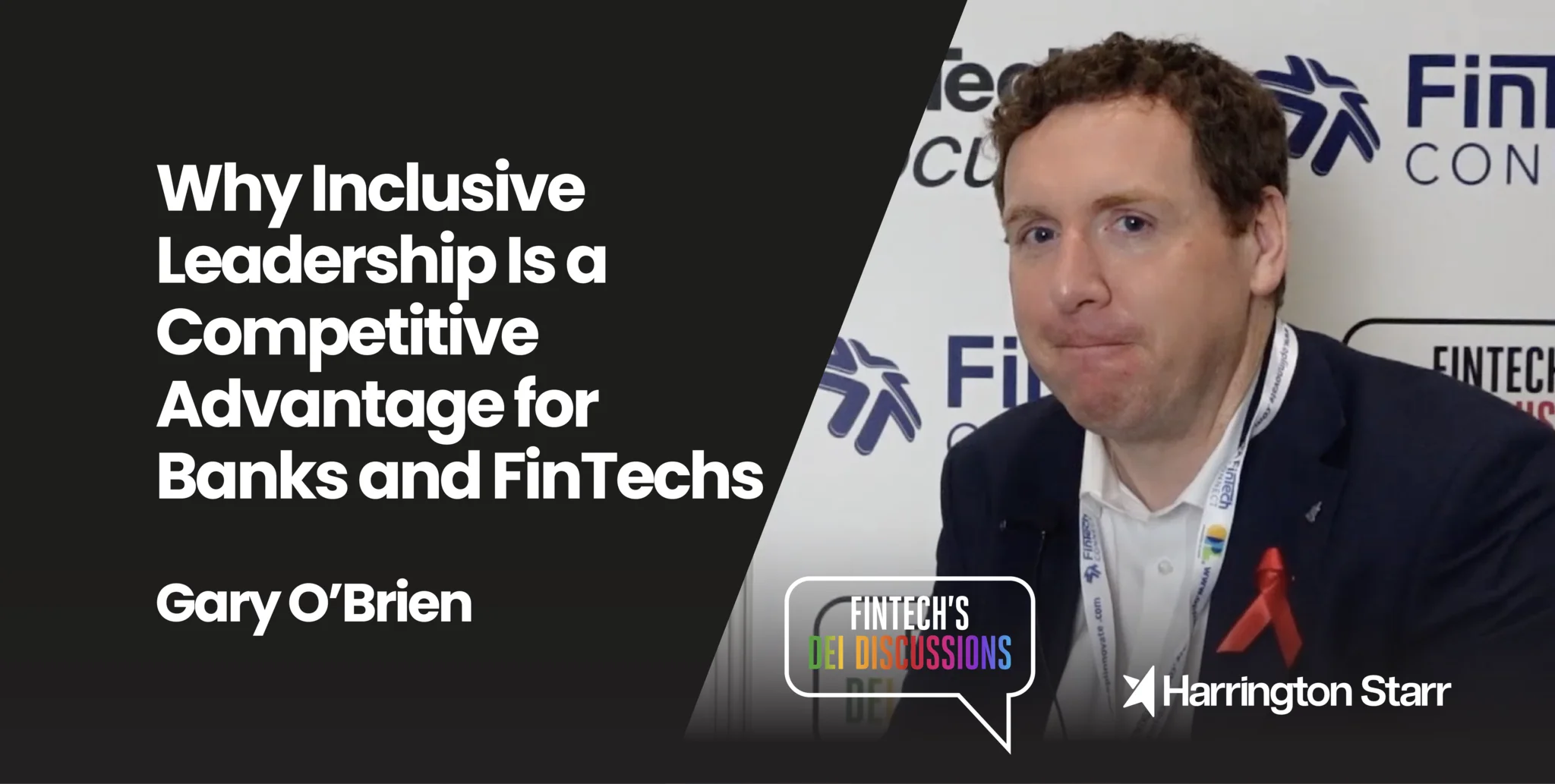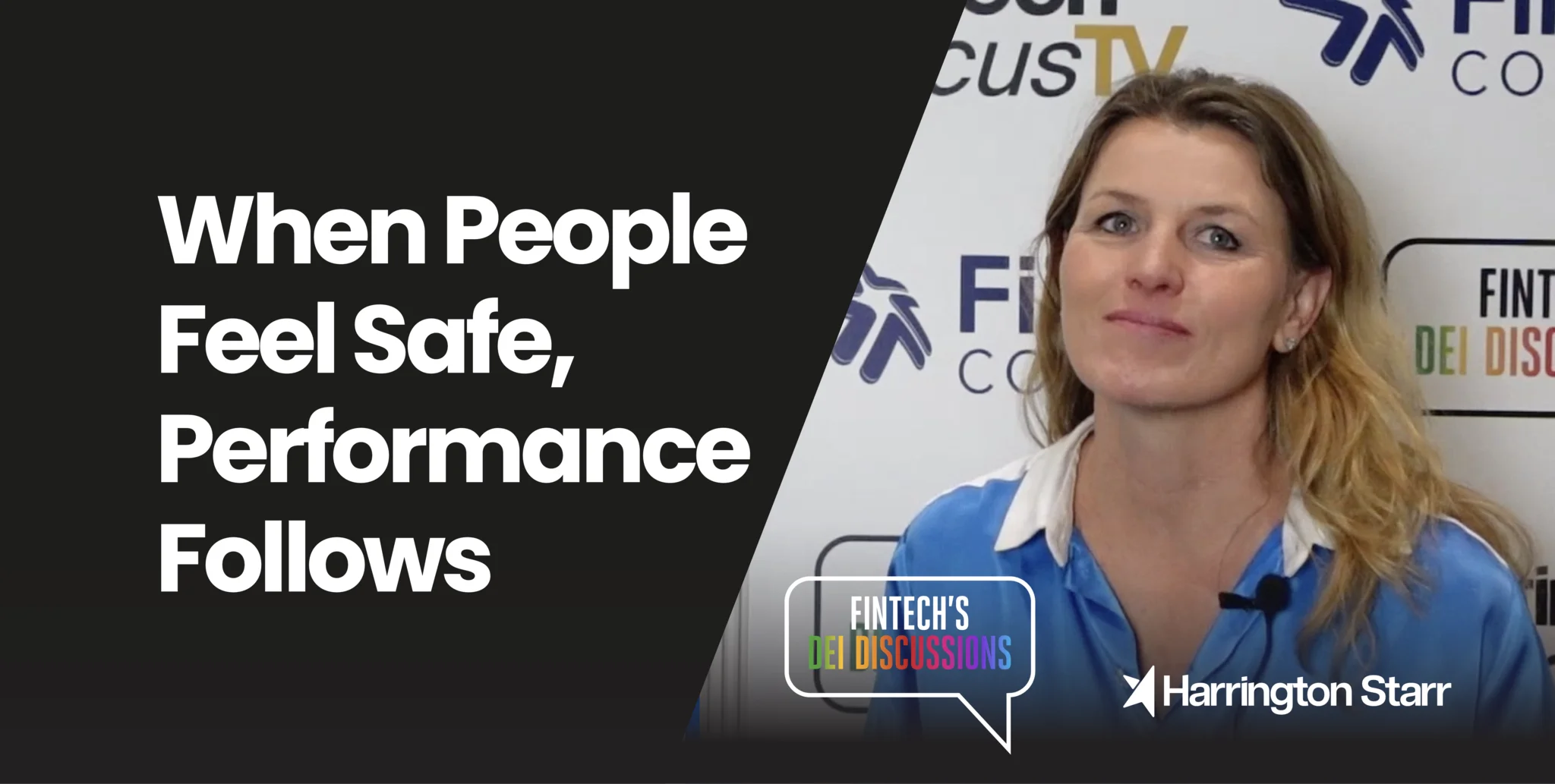How Laura Wilson Rebuilt Confidence, Returned to Work, and Found Her Place in Digital Transformation
The latest episode of FinTech’s DEI Discussions – part of the 12-part #TurnToTech podcast series hosted by Nadia – brings together the powerful story of Laura Wilson, Technology Project Manager at FinTrU. This conversation sits at the intersection of digital transformation, career reinvention, and the systemic factors shaping women’s access to tech. As a FinTech recruitment business, Harrington Starr is committed to helping employers understand what truly impacts talent pathways, and Laura’s story offers invaluable insight into the real experience behind returning to work, pivoting skills, and overcoming structural barriers within the digital workforce.
What follows is a comprehensive summary of the episode, rooted entirely in the transcript and told through the lens of how careers evolve, how support systems shape opportunity, and how the FinTech industry can better unlock talent from outside traditional pipelines. This is the essence of the #TurnToTech mission: making digital careers visible, accessible, and achievable for women everywhere.
FinTech Digital Careers: Understanding Laura Wilson’s Journey into Technology
The episode begins with Nadia welcoming listeners into the Turn to Tech podcast, a mini-series powered by FinTech’s DEI Discussions in partnership with the City of London’s Women Pivoting to Digital Taskforce. Its core aim is clear: to spotlight the journeys of women who have transitioned from non-technical backgrounds into digital roles, while highlighting the support systems that enabled them. This mission directly ties into the broader challenge the industry faces, FinTech needs more diverse talent pipelines, and yet tech careers remain shrouded in mystery for many who could thrive in them.
Against this backdrop, Laura Wilson shares her refreshingly honest story. Her career began with over a decade in a major consulting firm in London, a chapter filled with travel, opportunity, and professional reward. But like many women in demanding, travel-heavy roles, the introduction of children brought new constraints. The “up or out” culture she had once navigated with ease no longer aligned with the reality of two working parents in similar career paths. The professional identity she’d built no longer matched the structure she needed to support her family.
This early part of Laura’s story is a powerful reminder that women are not leaving tech; they are being pushed out by systems not built with them in mind. And for the FinTech recruitment world, this is a critical insight: the industry is losing experienced, capable, high-performing women long before they ever get the chance to explore technical roles.
When Laura took a three-year career break, she didn’t expect the emotional distance it would create from her professional identity. She describes feeling “detached” from her previous self, struggling with confidence, and feeling frustrated at not being able to turn her intention to return to work into action. Her story echoes something recruitment specialists see every day: talented women deeply underestimating their readiness to re-enter digital and FinTech environments.
Yet her turning point came when she realised she needed support, structure, and community, not more pressure to solve everything alone.
FinTech Recruitment and the Power of Structured Returner Pathways
Laura’s breakthrough arrived through a programme called Press Refresh, delivered by Women in Business Northern Ireland, the Department for the Economy, and Belfast Met College. Although she notes that not everyone will have access to a formal programme like this, she breaks down its components in ways that mirror what good hiring partners, line managers, and employers can replicate.
The programme gave her something she had been missing: a structured path back into the workforce. Once the process began, she had clarity that the end goal was to secure a new job, and that clarity alone was transformative. It removed uncertainty, replacing it with momentum. It also provided a peer group of women on similar journeys, a community that has continued beyond the programme itself. This group acted as a mirror, a support system, and a constant reminder that none of them were alone in their desire to return to fulfilling careers.
One of the most profound takeaways from this part of the episode touches directly on FinTech skills and talent development. The programme included training in areas such as Python and Power BI, skills Laura freely admits she hasn’t used since. But the point was not mastery of the tools. It was proof that she could learn again, could gain certifications, and could rebuild her capability even after stepping away from the workforce. Those certifications were less about the technology and more about restoring belief.
This insight has enormous implications for FinTech employers. Many returners do not lack competency; they lack confidence. By providing structure, peer support, and recognition, businesses can unlock extraordinary talent from an overlooked pool of experienced professionals.
When Laura transitioned into her role at FinTrU as a Technology Project Manager in Operational Technology, she did so with a renewed sense of self and with skills that, while newly acquired, reinforced her transferable strengths. She openly shares that she entered the environment not even knowing what a network switch was, yet her foundational project management and stakeholder skills enabled her to collaborate effectively with highly technical teams. This is the real meaning of “pivoting to digital”, bringing capabilities from one career chapter into a new context where they continue to create value.
Women in FinTech: The Critical Role of Mentorship and Support Systems
One of the most influential forms of support Laura received came after the programme ended. She was assigned a mentor, someone she describes as both supportive and constructively challenging, a combination that empowered her through her first year back at work.
Her mentor helped her see things differently, ask better questions, and approach challenges with greater resilience. This is a reminder that mentorship is not simply about comfort; it is about capability. It shapes how women navigate new environments, particularly in digital and FinTech roles where learning curves can be steep.
From a FinTech recruitment standpoint, this part of the episode highlights something vital: mentorship is often the missing piece in retention, not recruitment. Employers invest heavily in attracting diverse talent but too often overlook the systems that help people thrive once they arrive. Mentorship programmes, formal or informal, offer a cost-effective but deeply impactful way to support women entering technical pathways.
What Laura articulates beautifully is the emotional dimension of returning to work. Training can restore competence. Community can restore confidence. Mentorship can restore courage.
FinTech Talent Pathways: Regional Barriers and Opportunities for Women Entering Tech
One of the standout sections of the conversation comes when Nadia asks Laura about regional considerations for women turning to tech. This is when the episode expands beyond personal experience and into the broader structural and societal challenges affecting digital access across regions, particularly in Northern Ireland.
Laura outlines how cultural norms and behavioural traits, shaped by Northern Ireland’s collective history, affect professional confidence, career investment, and the willingness to take risks. Traits such as resilience, pragmatism, modesty, and loyalty to family and community are deeply rooted in Northern Irish identity. While these traits are strengths, they can also limit self-advocacy or the willingness to push beyond long-held expectations.
For the FinTech sector, which relies heavily on individuals selling their potential, showcasing capability, and “backing themselves,” these cultural dynamics matter. They influence who applies, who steps forward, and who feels entitled to participate in digital or transformation roles.
Laura then shifts to the practical infrastructure barriers that shape career decisions, childcare, social care, transport, and the lack of movement in childcare provision in Northern Ireland. She explains how these devolved areas of policy create a very different ecosystem than the rest of the UK and Ireland, particularly for mid-career women managing both childcare and responsibilities to older family members.
Her example comparing email alerts for transport strikes versus the silence around teacher strikes is a powerful illustration of how society undervalues childcare as critical infrastructure for working parents. For FinTech employers, this highlights the need for more intentional policies around flexibility, hybrid working, and support for those balancing family responsibilities.
This section of the episode reinforces that “digital access” is not solely about skill development. It is about the ecosystem surrounding that skill development. And for FinTech firms and the recruitment partners who support them, understanding these nuances is key to creating inclusive hiring strategies.
Career Confidence in Digital Roles: Laura’s Advice for Women Hesitant About Turning to Tech
Nadia closes the conversation by asking Laura for advice she would give to someone hesitant about making the leap into digital. Her answer is grounded, empathetic, and deeply aligned with the goals of the #TurnToTech campaign.
Laura acknowledges that hesitation is justified. Barriers are real. But she encourages women to be clear on their “why,” to anchor themselves in purpose so that they have something to hold onto when challenges arise. She emphasises the importance of looking ahead to the support they might need, whether emotional support from a friend, logistical support from a partner, or practical support during training or onboarding, and communicating those needs openly.
Her message is not one of reckless optimism but of intentional preparation. Digital careers are achievable, but they require support, structure, and clarity. And importantly, they require the courage to ask for help, something she had to learn herself.
This final message reinforces the theme of the episode: that turning to tech is not a solo journey. It is collective. It is supported. And it is made possible when systems, employers, families, and communities play their part.
How #TurnToTech Connects to FinTech Recruitment and the Future Workforce
As Harrington Starr continues working across FinTech, digital transformation, technology change, data, software engineering, product, and quant finance recruitment, stories like Laura’s offer essential lessons for building a stronger and more diverse talent ecosystem.
Her journey underscores the need for flexible pathways into FinTech roles, structured returner programmes, more empathetic leadership, and wider awareness of regional challenges affecting talent mobility. It also reinforces that transferable skills, from consulting to project management to people leadership, are often far more valuable than existing technical knowledge.
The #TurnToTech campaign exists to amplify these stories so more women feel empowered to explore FinTech careers and more employers recognise the extraordinary potential in non-linear professional journeys.
Laura’s episode is a testament to what is possible when capability meets opportunity, and when support systems are designed to help women succeed, not just survive, in digital and FinTech environments.






